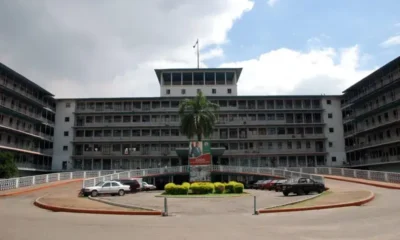Health
‘Alcohol can cause cancer’ says Surgeon General of USA

US Surgeon General Dr. Vivek Murthy issued an advisory Friday warning Americans that alcohol consumption can increase their cancer risk and called for an updated health warning label on alcoholic beverages.
Surgeon general’s advisories are strongly stated warnings meant to deliver clear messages about health risks. Advisories are uncommon and reserved for issues that need immediate awareness and action.
They often become turning points in the nation’s health habits.
A 1964 surgeon general’s report on smoking, for example, started to change the perception that cigarettes were benign. The new advisory may help do the same for drinking, which was once thought to be associated with some health benefits.
The new report aims to dispel any notion that alcohol is harmless. “Alcohol is a well-established, preventable cause of cancer responsible for about 100,000 cases of cancer and 20,000 cancer deaths annually in the United States – greater than the 13,500 alcohol-associated traffic crash fatalities per year in the US – yet the majority of Americans are unaware of this risk,” Murthy said in a statement.
Roughly 70% of Americans consume alcohol, according to Dr. Brian P. Lee, a liver specialist at Keck Medicine of the University of Southern California who researches the health effects of alcohol, and many are confused about whether an occasional drink is good or bad for them.
Only 45% of Americans surveyed by the American Institute for Cancer Research in 2019 said they believed that drinking alcohol causes cancer, the new advisory notes. The new surgeon general’s report is more in tune with modern evidence, Lee said.“Even light drinking … really, there’s no benefit, and in fact, there may be harm,” he said.
Alcohol is the third-leading preventable cause of cancer in the US, the new advisory says, after tobacco and obesity. It notes that the link between alcohol consumption and cancer risk is well-established for at least seven types of cancer: breast, colorectal, esophagus, liver, mouth, throat and voice box. And the risk remains regardless of what type of alcohol is consumed, and it increases with greater consumption.
Increasingly, evidence has mounted against alcohol consumption because of its health risks, negating a decades-long perception that some alcohol – especially red wine – could benefit health.
Still, nuances persist: A report in December from the National Academies of Sciences, Engineering, and Medicine concluded that moderate drinking – two drinks a day or fewer for men and one for women – may be associated with lower risks of cardiovascular disease.
It also found that moderate drinking was associated with a higher risk of certain types of cancer. “There was actually a time when we thought red wine increases risk of some cancers, but the positive effects for cardiovascular disease overwhelm the negative effects for cancer,” said Dr. Otis Brawley, an oncologist at Johns Hopkins University and former chief medical and scientific officer for the American Cancer Society.Over the past three years, however, a steady stream of scientific
Over the past three years, however, a steady stream of scientific evidence and comprehensive research reviews have disproved that idea.“People need to be warned,” Brawley said.
“There is no safe amount of alcohol.” Alcohol causes cancer in at least four ways, the advisory notes. It is metabolized into a chemical called acetaldehyde, which damages DNA.
Damaged DNA can then cause cells to divide out of control, leading to cancer. “For those sites where there is direct contact … this is clearly the mechanism,” said Dr. Béatrice Lauby-Secretan, head of the Handbooks Programme at the International Agency of Cancer Research, or IARC.
Those sites include the mouth, esophagus, stomach and colon, she added.A recent IARC report found that about 20% of the nearly 75,000 lip and mouth cancers diagnosed worldwide each year are caused by drinking alcohol, for example.
Alcohol also creates unstable molecules called free radicals that can damage DNA and lead to cancer.It alters levels of hormones, like estrogen and testosterone, which increases cancers at hormone-sensitive sites like the breast and prostate.
Alcohol also depletes levels of important nutrients, such as B vitamins and folate, that help protect the body against cancer, said Dr. Shuji Ogino, a professor of epidemiology and pathology at Brigham and Women’s Hospital.
Alcohol is a powerful solvent too, so when it comes into contact with other carcinogens like cigarettes, it extracts higher levels of cancer-causing substances from those products and potentiates their effects.
That makes it an especially dangerous companion for any kind of tobacco product, including smokeless tobacco. “It’s no longer two plus two equals four. It’s two plus two equals six,” Lauby-Secretan said.
For cancers like those of the breast, mouth and throat, the risk may start to develop with one or fewer drinks per day, the surgeon general’s office said. It also noted that any individual’s cancer risk is influenced by a number of factors, including their own biology and environment.
Alcohol increases cancer risk for both sexes, but the risks of drinking are higher for women than for men.A woman who lives to be 80 years old has a roughly 17% chance of developing an alcohol-related cancer over the course of her lifetime, even if she drinks less than one drink per week, the report notes.
That risk rises with the amount of alcohol consumed. With one drink a day, women have a 19% risk of developing an alcohol-related cancer, and there’s a nearly 22% risk of developing an alcohol-related cancer with two drinks a day.
For men, those same risks are 10% for less than one drink a week, 11% for one drink a day and 13% risk at two daily drinks. There are several reasons why women are more vulnerable to alcohol-related cancers. Body size is one factor. Women are generally smaller, “so at the same quantity of alcohol use, you have higher blood levels and exposure of each cell in your body to alcohol,” Lee said.
Alcohol also interacts with body fat, which women tend to have more of than men, and disrupts hormonal balance, which can spur the development of cancers of the breast and prostate, Lee said.Doctors said they were pleased to see the new advisory.
“I was very excited about this report,” said Dr. David Greenberg, chief of hematology and oncology at Hackensack Meridian Jersey Shore University Medical Center. “I’ve been kind of harping on this for a few years now.“
it’s remarkable how many of my family and friends and patients are just not aware of how dangerous and toxic alcohol can be,” he said. Greenberg said he’s a drinker but watches his consumption. He’s doing “dry January,” a social movement to encourage abstinence from alcohol for the first month of the year.
“If you play it by the book, you shouldn’t drink any alcohol, because it’s all toxic,” he said, but he also tells his patients that abstaining completely isn’t very realistic or fun.
“If you’re going to drink, it should be done very moderately and not that frequently,” he said.Surveys show that certain groups are getting the moderation message. Mocktails are gaining social acceptance as a way to cut back, and spirits manufacturers are offering more nonalcoholic alternatives to their products, too.
Younger adults in the US have already started to view drinking as less healthy; an August Gallup poll found that almost half of Americans say that having one or two drinks a day is bad for a person’s health – the highest percentage recorded in the survey’s 23 years.
Younger adults were most likely to say drinking is bad for health. The surgeon general’s advisory also calls for guideline limits for alcohol consumption to be assessed to account for cancer risk, and seeks to raise awareness for individuals about the link to cancer risk as they decide whether and how much to drink.
“I 100% agree with this, and there should be a warning label,” Ogino said. “It should have happened a little bit earlier,” he said, but better late than never.
An updated warning label on alcoholic beverages to reflect cancer risk would require approval from Congress. The currently required warning says that women shouldn’t drink alcoholic beverages during pregnancy and that consuming alcohol impairs your ability to drive a car or operate machinery, and may cause health problems.
The advisory points out that it “has remained unchanged since its inception in 1988.” The current warning “has long informed consumers about the potential risks of the consumption of alcohol,” Dr. Amanda Berger, senior vice president of science and research at the Distilled Spirits Council, said in a statement Friday.
“Many lifestyle choices carry potential risks, and it is the federal government’s role to determine any proposed changes to the warning statements based on the entire body of scientific research.”Murthy noted to CNN’s Wolf Blitzer on Friday that health care providers can help increase awareness of the risks, too. “Doctors and nurses can play a role in educating patients about this.
And I want everybody to know out there that, especially if you’re concerned about this, if you have a personal history of cancer or family history of cancer, one of the things you can do to reduce your risk is reconsider how much you drink,” Murthy said. The American Medical Association, which has long recognized alcohol as a cancer risk, cheered the new advisory.
“Today’s advisory, coupled with a push to update the Surgeon General’s health warning label on alcoholic beverages, will bolster awareness, improve health, and save lives,” AMA President Dr. Bruce Scott said in a statement. Murthy has also issued Surgeon General’s Advisories on topics including firearm violence, loneliness and isolation, social media and youth mental health, and the mental health of parents.
Health
Nigeria Struggles to Meet Exclusive Breastfeeding target

- UNICEF Advocates for Breastfeeding Rights of Displaced Families
- Abia State Reaffirms Commitment to Paid Maternity and Paternity Leave
The United Nations Children’s Fund (UNICEF) has emphasized the importance of enhancing government and community support to protect the well-being of nursing mothers who are facing significant challenges due to conflict and displacement. The organization highlighted that infants born in such circumstances should not be denied their fundamental right to adequate nutrition and care.
Stressing the need for immediate psychological, nutritional, and social protection interventions, UNICEF called for comprehensive measures to ensure that breastfeeding practices are maintained, even in crisis situations.
During an event marking World Breastfeeding Week, Muhammad Okorie, UNICEF’s Social Policy Manager, underscored the vital role of breast milk in delivering essential nutrients and hydration to infants, debunking myths that suggest the need for supplementary water or alternatives.
Meanwhile, Priscilla Otti, the wife of the Abia State Governor, reiterated the state government’s commitment to providing six months of paid maternity leave for nursing mothers and three weeks of paternity leave for fathers to foster bonding with their newborns.
She made these statements while launching the state’s 2025 World Breastfeeding Week celebrations in Umuahia, the capital of Abia State. Otti noted that the government aims to exemplify mother-friendly workplace policies, including the establishment of crèches in both public and private sectors, starting at the state High Court headquarters and the state secretariat in Umuahia.
Additionally, while inaugurating a completed crèche in Umuahia, Mrs. Otti expressed her joy in being part of the initiative and stated that she provided the furnishings and equipment to ensure the space is functional, welcoming, safe, and nurturing for the children.
Credit: The Guardian
Health
Nurses call off nationwide strike

The industrial action initiated by the National Association of Nigerian Nurses and Midwives (NANNM) has officially been called off, as confirmed by Health Minister Ali Pate. In a press conference held after a closed meeting on Friday, Pate stated that the suspension followed successful negotiations with the association’s leadership.
Despite the resolution, the union representatives chose not to speak to the press after the discussions. Members of the association had started a warning strike on July 29, 2025, in response to the government’s lack of action following a 15-day ultimatum delivered on July 14. This strike, which affected federal health institutions across the country, was originally planned to continue until August 5.
The strike was prompted by dissatisfaction regarding inadequate welfare and working conditions for nurses. The association has been advocating for enhanced welfare packages, fair allowances, and improved work environments. Earlier, NANNM National Chairman Morakinyo Rilwan accused the Federal Government of neglecting to engage with the association during the negotiation process, emphasizing the lack of communication from the government.
Rilwan stated, “As far as we are concerned, there has been no communication from the government up to this moment. That is why we are saying the strike is on, and nothing is stopping it. Even if the government calls today or tomorrow, it won’t halt the strike. They had sufficient time.”
The demands put forth by the association include an increase in shift allowances, adjustments to uniform allowances, the establishment of a unique salary structure for nurses, increased core duty allowances, large-scale recruitment, and the creation of a dedicated nursing division within the Federal Ministry of Health. Rilwan pointed out that the decision to strike was not solely made by the leadership but also expressed the frustration of members regarding the long-standing neglect of their issues.
Health
Lagos Doctors Initiate Three-Day Warning Strike Over Salary Issues

Government: We Are Addressing the Concerns
Medical doctors employed by the Lagos State Government are set to commence a three-day warning strike today to protest what they consider “unlawful and disrespectful” salary deductions made by the state.
The strike, announced by the Medical Guild, which represents medical and dental professionals in the public sector of the state, will start at 8 a.m. and conclude at the same time on Thursday.
During a press conference held at the Guild’s headquarters in Lagos, Chairman Dr. Japhet Olugbogi stated that the decision came after multiple unsuccessful attempts to resolve the issue through dialogue.
He explained that the conflict initiated in April when the state government deducted a portion of doctors’ salaries without consultation. While these deductions were later reversed after significant intervention and strategic discussions, a new round of deductions occurred in July, “this time without any prior warning or justification.”
The doctors have outlined their main demands, which include the prompt reversal of the July salary deductions and the complete payment of the 12-month revised Consolidated Medical Salary Structure (CONMESS) arrears owed to honorary consultants at the Lagos State University Teaching Hospital (LASUTH).
As of the latest updates, the Lagos State Government had not yet provided an official response to the doctors’ planned strike action.
In response to the Medical Guild’s concerns, the Ministry of Health has stated that the government is actively reviewing “all grievances of the doctors with the utmost sincerity and urgency.”
“Negotiations and discussions with the Medical Guild are ongoing,” reported Mr. Tunbosun Ogunbanwo, the ministry’s Director of Public Affairs, in a statement last night.
The statement elaborated: “This is the first occurrence of such a situation in recent years, and the government is particularly focused on the welfare, motivation, and productivity of all healthcare workers within the state.
“A conciliation committee, consisting of representatives from both the Medical Guild and the government, was previously established to address all outstanding concerns. Meetings have taken place, and the documents submitted by the Guild are currently under careful review in accordance with existing policies and fiscal regulations.
“As a responsible government, we greatly appreciate the crucial role our healthcare professionals play in providing quality and timely health services to over 20 million residents in Lagos State. We urge the Medical Guild to maintain a dialogue-centric approach while we strive for a peaceful and equitable resolution that serves all parties, especially the residents who could suffer from any disruption in services.”
The Lagos State Ministry of Health therefore requests that the Medical Guild reconsider its warning strike and allow ongoing discussions to reach a successful conclusion. Governor Babajide Olusola Sanwo-Olu is committed to enhancing the welfare of healthcare workers and ensuring harmony within the health sector.
“We appreciate the patience and understanding of the citizens of Lagos and assure the public that contingency plans are being established to minimize any impact on healthcare services during this period.”
-

 News10 months ago
News10 months agoNUJ FCT Council Mourns The Loss of Senior Journalist, Isaiah Abraham
-

 News10 months ago
News10 months agoHURIWA Declares Governor Fubara’s Emergence as Divine, Urges Support for Rivers State’s Progress
-

 News10 months ago
News10 months agoAnioma State as panacea to South-East marginalization – By Emmanuel Onwubiko
-

 Opinion8 months ago
Opinion8 months agoNIGERIAN WOMAN IN DIASPORA, CULTURAL SHOCKS – By Stacey Ukaobasi Onwuegbuchulam
-

 News11 months ago
News11 months agoHURIWA Blames Serial Stampedes on Weaponized Poverty, Warns of Nigeria’s Rapid Decline
-

 News10 months ago
News10 months agoJealous Husband Stabs Nigerian Bishop To Death Over Suspicion Of Sleeping With Estranged Wife
-

 News10 months ago
News10 months agoTinubu sympathizes with ex-speaker Bankole on the death of his mother
-

 Health8 months ago
Health8 months agoA complete list of 154 healthcare facilities across Nigeria that provide free emergency obstetric care and VVF (Vesico-Vaginal Fistula) surgeries.













